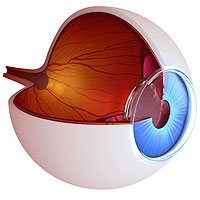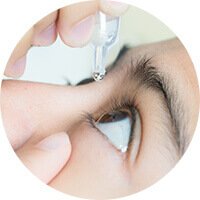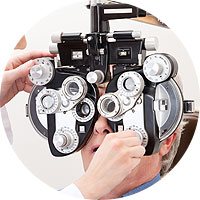Almost every human being will develop a cataract during their lifetime, but it’s comforting to know that cataract surgery is a commonly performed procedure that clears vision and even offers the opportunity to correct conditions such as astigmatism.
Life After Cataract Surgery – Hear From Real Patients
Cataract Surgery in Scranton
Cataracts are an age-related condition that results in a clouding of your eye’s lens. When a cataract develops, it causes light to scatter instead of focusing properly. Over time, cataracts lead to deterioration of your vision and if left untreated, they can eventually result in blindness.
Fortunately, modern medicine provides you with a safe and effective treatment for cataracts. Cataract surgery can be performed to replace your eye’s clouded natural lens with a clear, artificial replacement lens called an intraocular lens (IOL).
The most obvious benefit of cataract surgery is the restoration of clear vision. Colors will appear brighter and more vibrant, images will be sharper, and objects that used to be fuzzy will return to focus. You should also experience a reduction in glare from the sun or from oncoming headlights when driving at night.
There are several important lifestyle benefits of cataract surgery. Many of our patients find that they have a renewed sense of independence following their procedure. If you were unable to drive due to your cataracts, cataract surgery will give you the vision to get behind the wheel again. You may also enjoy many of your favorite hobbies much more once you have clear vision.
Other benefits of cataract surgery include:
- Quick recovery time
- Minimal risk of infection
- Smaller incision which eliminates the need for stitches
- Most advanced IOLs produce sharp vision and may reduce or eliminate the need for corrective lenses after your procedure
A cataract is caused by a change in the chemical composition of the lens. The most common cause for this change is the natural aging process. As we mature, the normally flexible, clear material of the lens becomes hard and cloudy. Unfortunately, there is no way to prevent the development of cataracts. Everyone who lives long enough will eventually develop the problem.
Although most commonly seen in adults after the age of 40, cataracts can occur at any age. The condition may be present at birth or caused by an injury to the eye. Infections and other eye diseases, such as glaucoma and eye tumors, may cause the development of a cataract. Vision loss is usually gradual as a cataract develops.
The ophthalmologists at Eye Care Specialists are some of the most experienced cataract surgeons in the Northeastern Pennsylvania region. Our doctors have collectively performed more than 50,000 successful cataract surgeries throughout their careers.
At Eye Care Specialists, our doctors are always doing research on new lenses used with cataract surgery. We conduct case studies and research new technology to ensure you achieve the best possible results. Our cataract surgeons use only the highest quality materials with our IOLs to ensure better vision and longer-lasting results.
If your ophthalmologist has recommended cataract surgery, you may be wondering what to expect in the days and weeks following your procedure. Can I drive? How soon will I notice a difference in my vision? The experienced Northeastern Pennsylvania cataract surgeons at Eye Care Specialists understand your concerns and will provide you with detailed post-operative instructions for a smooth recovery.
This page will provide you with a basic overview of the cataract surgery recovery process, but we’d be happy to discuss these items with you in greater detail face to face. Please call 1-877-489-7405 today to schedule a consultation at one of our Northeastern Pennsylvania ophthalmology offices.
Plan to take the entire day off. Even though the procedure itself is brief, you’ll need to rest at home after we’re done. You’ll probably be able to drive within a couple of days but arrange for a friend or family member to drive you home from our office.
After your doctor has completed your cataract surgery, we’ll place a protective shield over your eye. Then you’ll rest in our recovery area for about half an hour as the anesthesia wears off and we monitor your initial recovery.
You can remove the protective eye shield within a few hours, but we may ask you to wear it during sleep for a few days to protect your eye as it heals. When you first remove the shield, your vision might seem blurry or distorted. This is normal as your eye adjusts to its new intraocular lens (IOL).
Some side effects you might experience after surgery include
- Dry or itchy eyes
- Red eyes
- Blurry vision
- Discomfort
Over-the-counter medication helps reduce pain and inflammation for most patients, but call your eye doctor if you experience severe pain or vision loss.
Although you may notice a significant improvement in your vision within days or even hours, it may take a couple of weeks for your vision to stabilize. Every patient is different. Take it easy and get plenty of rest, especially during the first few days following cataract surgery.
You may be able to resume your normal daily activities a day or two after surgery. But to prevent complications and ensure that your eye heals properly, observe these helpful guidelines:
- Avoid heavy lifting or strenuous activities for a few weeks
- Avoid swimming pools and hot tubs to prevent an eye infection
- Avoid getting water in your eyes when you shower
- Avoid exposing your eyes to such irritants as wind and dust
- Don’t rub your eyes
Your doctor may prescribe an antibiotic and anti-inflammatory eye drops to help you heal in the week following surgery. Depending upon how much inflammation you experience, these may be needed for up to a month.
The cataract surgeons at Eye Care Specialists are among the most experienced in Northeastern Pennsylvania. We have collectively performed more than 50,000 successful cataract surgeries, and we continuously research new lens materials and technologies to offer you the best vision possible.

















